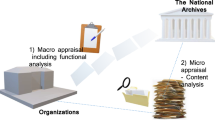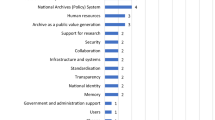Abstract
Archives are facing many challenges as information overload and increasing societal diversity. These two trends ask for decided measures, one in terms of selection and the other in terms of expanded information preservation to document all societal groups appropriately. These opposing trends force archivists to rethink permanently their appraisal politics and their functional orientation. Basic archival functions have to be aligned on one hand with services for an organisation related to democratic standards as accountability and transparency and on the other hand with a memory politics aiming at an extensive documentation of the enormous societal diversity by preserving the (cultural) patrimony of all groups to facilitate their identity-building. By looking back in our institutional history and comparing the Swiss and the Canadian approach in appraisal as well as the larger political context of documenting, we aim to show that a clear functional orientation, a transparent and participatory process of selection, a cooperative approach in fulfilling existing challenges and duties as well as a sound understanding of our institutional past help to make the necessary choices. It is important to stress, firstly, that archives as multifunctional institutions serve the principles of democracy and support the rule of law, and secondly, that by selecting documents for preservation and by reducing the mass of information, we nonetheless will preserve an abundant documentary heritage, which will not only serve to stabilize societal (or communitarian) identity but it will still serve as a reservoir feeding essential scepticism as an engine for progress.
Similar content being viewed by others
Notes
The Facebook community, for example, is, with its more than 835 million ‘friends’ (as of March 2012), the third biggest and pluralistic ‘societal’ groups after the Chinese and Indian national societies and bigger than the United States; as a mobilization instrument, it also supports real-life group building.
"Notre présent ne cesse de recycler le passé au point que l’histoire devient une ressource de plus en plus instrumentalisée pour stigmatiser tout adversaire et surmonter l’adversité" (Dosse 2010).
References
Arbeitskreis Gelebte Geschichte (Groupe de travail histoire vécue), Tätigkeitsbericht 1997–1999 (1999) http://www.gelebte-geschichte.ch/jahresberichte/frame_jahresberichte_d.htm. Accessed 13 June 2012
Banerjee U (2010) Cloud Economics—Amazon, Microsoft, Google Compared. Cloud Computing Journal, January 25. http://cloudcomputing.sys-con.com/node/1257999. Accessed 13 June 2012
Bell G, Gemmell J (2009) Total recall: how the E-memory revolution will change everything. Dutton, New York
Caron D (2010) Socialization, regulation and technology: information above borders. 10e Congresso Nacional de Bibliotecarios, Arquivistas e Documentalistas. http://www.bad.pt/publicacoes/index.php/congressosbad/article/view/223. Accessed 13 June 2012
Caron D (2011) Web HT.0. Pour une société informée : la pertinence numérique et ses défis pour les sociétés démocratiques au XXIe siècle. Paris, Éditions Hermann
Caron DJ, Kellerhals A (2011) Supporting democratic values through a relevant documentary foundation—an evolutionary complex. Archivaria 71:99–134
Dosse F (2010) Il faut rejeter les abus de la mémoire et le brouillage des repères historiques. Le Monde 15 Oct
Ferriero D (2010) Are we losing our memory? The view from the national archives. Presentation. http://www.provost.duke.edu/speaker_series/09-10/ferriero.html. Accessed 13 June 2012
Frei N (2008) Generation Sündenstolz. Zum erneuten Dienstjubiläum der “Achtundsechziger”. Neue Zürcher Zeitung 8/9 March
International Council on Archives (1996) Code of ethics, adopted by the General Assembly in its XIIIth session in Beijing (China) on 6 September 1996. http://www.ica.org/5555/reference-documents/ica-code-of-ethics.html. Accessed 13 June 2012
IDC iView (2010) The digital universe decade—are you ready? May 2010, sponsored by EMC. http://chucksblog.emc.com/content/DU2010text.pdf. Accessed 13 June 2012
Jonas H (1979) Das Prinzip Verantwortung. Versuch einer Ethik für die technologische Zivilisati on, Suhrkamp, Frankfurt am Main (Transl (1984) The Imperative of Responsibility, University of Chicago Press, Chicago)
Kaufmann C, Leimgruber W (2008) Ce que des dossiers peuvent provoquer. Processus d’intégration et d’exclusion d’un acte administratif. Éditions Seismo, Zurich
Kellerhals A (ed) (2006) Mémopolitique—de l’usage de la mémoire des sociétés. Stämpfli, Bern
Koller A (1997) Switzerland and its recent contemporary history. http://www.parlament.ch/e/dokumentation/dossiers/dossiers-archiv/ch-weltkrieg-2/beitraege/pages/default.aspx. Accessed 13 June 2012
Koselleck R (1979) Vergangene Zukunft. Zur Semantik Geschichtlicher Zeiten. Suhrkamp, Frankfurt am Main
Lancaster FW (1985) The paperless society revisited. Am Libraries 16(8):553–555
Leimgruber W, Meier T, Sablonier R (2000) L’œuvre des enfants de la grande-route. Etude historique réalisée à partir des archives de la Fondation Pro Juventute déposées aux Archives fédérales suisses. Archives fédérales, Berne
Library and Archives Canada (2012) School Files Series 1879–1953 (RG10). http://collectionscanada.gc.ca/pam_archives/index.php?fuseaction=genitem.displayItem&lang=eng&rec_nbr=157505&rec_nbr_list=157505,135674,142034,1561778,2099550,130125,45053,43427,205908,205858. Accessed 13 June 2012
Library of Congress (2010) Twitter donates entire tweet archive to library of congress. April 15. http://www.loc.gov/today/pr/2010/10-081.html. Accessed 13 June 2012
Mastronardi P (1991) Kriterien der demokratischen Verwaltungskontrolle : Analyse und Konzept der parlamentarischen Oberaufsicht im Bund, Bern, Habilitationsschrift. Helbing und Lichtenhahn, Basel
Meehan J (2009) The archival nexus: rethinking the interplay of archival ideas about the nature, value, and use of records. Arch Sci 9:157–164
Mooser J (2000) Spiritual national defence in the 1930 s: Swiss political culture between the wars. In: Kreis G (ed) Switzerland and the second world war. Frank Cass, London Portland, pp 236–260
Nora P (2010) Lettre ouverte à Frédéric Mitterrand sur la Maison de l’histoire de France. Le Monde, 11 Nov
Pearson J (1995) Access to confidential business information in government files. In: Morissette Y et al (eds) Open justice. Canadian Institute for the Administration of Justice, Montreal
Renan E (1882) Qu’est-ce qu’une nation? Conférence donnée en Sorbonne, le 11 mars 1882. http://identitenational.canalblog.com/archives/2008/10/02/10803170.html. Accessed 13 June 2012
Rüsen J (2002) Geschichte im Kulturprozess. Böhlau Verlag, Köln
Van Dongen L (2000) Swiss memory of the second world war in the immediate post-war period 1945–48. In: Kreis G (ed) Switzerland and the second world war. Frank Cass, London Portland, pp 261–281
Young A (2008) Aftermath of a prediction: F. W. Lancaster and the paperless society. Library Trends 56(4):843–858
Zittrain J (2010) The historical record in the digital age. Presentation at Duke University—Provost’s Lecture Series 2009/10: The Future of the Past, The Future of the Present. http://www.youtube.com/watch?v=_kpur7yJ7EE. Accessed 13 June 2012
Author information
Authors and Affiliations
Corresponding author
Rights and permissions
About this article
Cite this article
Caron, D.J., Kellerhals, A. Archiving for self-ascertainment, identity-building and permanent self-questioning: archives between scepticism and certitude. Arch Sci 13, 207–216 (2013). https://doi.org/10.1007/s10502-012-9189-y
Published:
Issue Date:
DOI: https://doi.org/10.1007/s10502-012-9189-y




